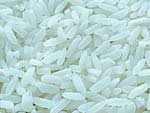 Wall Street Journal: Iran has slashed its purchases of India’s basmati rice by around half over the past three months, helping push India’s domestic prices nearly 10% lower in recent weeks.
Wall Street Journal: Iran has slashed its purchases of India’s basmati rice by around half over the past three months, helping push India’s domestic prices nearly 10% lower in recent weeks.
Shipments fall by half over past three months
The Wall Street Journal
By Biman Mukherji and Benoit Faucon
 Iran has slashed its purchases of India’s basmati rice by around half over the past three months, helping push India’s domestic prices nearly 10% lower in recent weeks.
Iran has slashed its purchases of India’s basmati rice by around half over the past three months, helping push India’s domestic prices nearly 10% lower in recent weeks.
In cutting its purchases, some Iranian buyers have cited stringent new Iranian standards on chemical contamination and dissatisfaction with the quality of rice being delivered, saying grades were below those specified in contracts.
India’s export prices haven’t fallen yet, but it is only a matter of time before they do, traders said.
“We expect to see a price impact on Indian [rice] exports within a week,” said Vijay Setia, a member of the All India Rice Exporters Association.
India and Iran created what is essentially a barter system two years ago to skirt Western sanctions on Iran over its disputed nuclear program. In exchange for Iranian oil, India sells Iran a range of goods, primarily rice, soymeal and pharmaceuticals.
Under the trade arrangement, India pays for part of the crude oil it receives from Iran in rupees. The funds are then deposited at India’s state-run UCO Bank 532505.BY +0.15% and used to pay Indian companies for exports of food and other products to Iran.
Mostafa Pakzad, chairman of Iranian trading company Pakzad Consulting Corp., whose business includes commodities, said Iran’s rice imports from India had fallen because of tightened regulatory oversight by Iran.
Rajan Sundaresan, executive director of All India Rice Exporters Association, suggested Iranian buyers might be positioning themselves to demand lower prices. “There is going to be a meeting soon and we are hoping it would be smoothed out by the end of the month,” he said.
Whether a recent slowdown in oil deliveries from Iran to India is affecting the rice trade isn’t clear. Iranian oil exports to India fell by more than half to 200,000 barrels a day in April from 415,000 barrels a day in January, according to data from the International Energy Agency.
India is the largest exporter of rice to Iran. In the financial year ended in March 2014, India’s sales of basmati rice to Iran totaled 1.45 million metric tons, valued at $1.83 billion, Indian government data show. India shipped about 130,000 tons a month of basmati until February, but sales have since plunged to 50,000-60,000 tons a month, Indian traders said.
India exports only high-grade basmati rice to Iran, so the decline in shipments isn’t expected to have much impact on the price of lower-grade rice from major exporters such as Thailand or Vietnam. Basmati rice costs nearly five times as much as common grades.
In India, domestic prices for basmati have fallen over the past two weeks as a result of weaker demand from Iran. Benchmark 1121 basmati has been trading at around $1,400 to $1,500 a ton for most of this year, but some buyers have started asking for discounts of $50 to $100 a ton.
The drop in shipments to Iran comes as Indian farmers are planting more basmati rice to meet previously strong demand from Iran and other traditional buyers, including Saudi Arabia and Iraq.
Slow processing of payments in rupees by UCO Bank to Indian exporters from an Iranian account is also hampering trade, Mr. Pakzad said.
UCO Bank executives denied that any payments had been delayed.
Tejinder Narang, an independent commodities analyst, said it is unclear when shipments of basmati rice to Iran may pick up again. In any case, it is likely to happen eventually, because Pakistan is the only other supplier of basmati-type rice to Iran, but it has smaller available stocks and no formalized barter trade.


